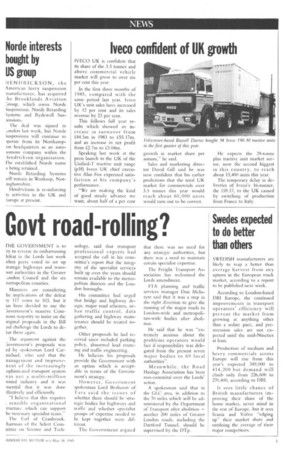Govt road-rolling?
Page 7

If you've noticed an error in this article please click here to report it so we can fix it.
[HE GOVERNMENT is to ry to reverse its embarrassing iefeat in the Lords last week when peers voted to set up mrategic highways and transport authorities in the Greater ,ondon Council and the six netropolican counties.
Ministers are considering he implications of the defeat xy 117 votes to 103, but it las been decided to use the Government's massive Comnons majority to insist on the original proposals in the Bill ind challenge the Lords to de-eat them again.
The argument against the 7.4overnment's proposals was ed by spokesman Lord Carnichael, who said that the nanagement and improvenent of the increasingly ophisticated transport system vas not a multi-million oound industry and it was ssentiai that it was done ffectively and efficiently.
"I believe that this requires sensible organisational tructure which can support he necessary specialist team."
The Earl of Cranbrook, lairman of the Select Comnittee on Science and Tech nology, said that transport professional experts had accepted the call in his committee's report that the integrity of the specialist services built up over the years should remain available to the metropolitan districts and the London boroughs.
His committee had urged that bridge and highway design, major road schemes, urban traffic control, data gathering and highway maintenance should be treated together.
Other proposals he had received since included parking policy, abnormal load routeing and traffic engineering.
He believes his proposals provide the Government with an option which is acceptable in terms of the Government's strategy.
However, Government spokesman Lord Brabazon of Tara said the issues of whether there should be strategic bodies for highways and traffic and whether specialist groups of expertise needed to be kept together were different.
The Government argued that there was no need for any strategic authorities, but there was a need to maintain certain specialist expertise.
The Freight Transport Association has welcomed the Lords amendment.
FTA planning and traffic services manager Don McIntyre said that it was a step in the right direction to give the running of the major roads to London-wide and metropolitan-wide bodies after abolition.
He said that he was "extremely anxious about the problems operators would face if responsibility was delegated from the present seven major bodies to 69 local authorities".
Meanwhile, the Road Haulage Association has been non-commital over the Lords' action.
A spokesman said that in the GLC area, in addition to the 70 miles which will be adrninistered by the Department of Transport after abolition — another 200 miles of Greater London roads, including the Dartford Tunnel, should be supervised by the DTp.




















































































